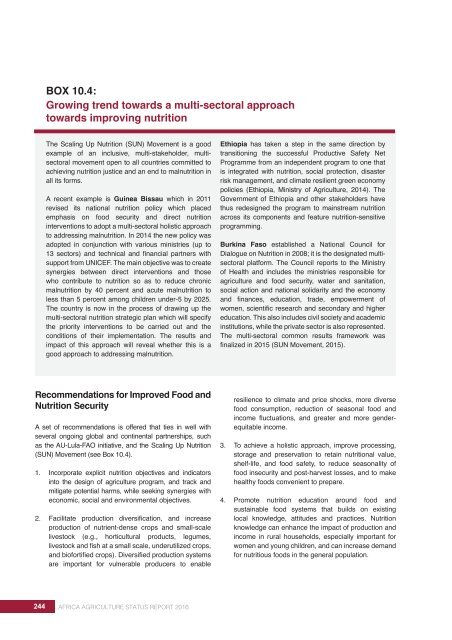AFRICA AGRICULTURE STATUS REPORT 2016
AASR-report_2016-1
AASR-report_2016-1
You also want an ePaper? Increase the reach of your titles
YUMPU automatically turns print PDFs into web optimized ePapers that Google loves.
BOX 10.4:<br />
Growing trend towards a multi-sectoral approach<br />
towards improving nutrition<br />
The Scaling Up Nutrition (SUN) Movement is a good<br />
example of an inclusive, multi-stakeholder, multisectoral<br />
movement open to all countries committed to<br />
achieving nutrition justice and an end to malnutrition in<br />
all its forms.<br />
A recent example is Guinea Bissau which in 2011<br />
revised its national nutrition policy which placed<br />
emphasis on food security and direct nutrition<br />
interventions to adopt a multi-sectoral holistic approach<br />
to addressing malnutrition. In 2014 the new policy was<br />
adopted in conjunction with various ministries (up to<br />
13 sectors) and technical and financial partners with<br />
support from UNICEF. The main objective was to create<br />
synergies between direct interventions and those<br />
who contribute to nutrition so as to reduce chronic<br />
malnutrition by 40 percent and acute malnutrition to<br />
less than 5 percent among children under-5 by 2025.<br />
The country is now in the process of drawing up the<br />
multi-sectoral nutrition strategic plan which will specify<br />
the priority interventions to be carried out and the<br />
conditions of their implementation. The results and<br />
impact of this approach will reveal whether this is a<br />
good approach to addressing malnutrition.<br />
Ethiopia has taken a step in the same direction by<br />
transitioning the successful Productive Safety Net<br />
Programme from an independent program to one that<br />
is integrated with nutrition, social protection, disaster<br />
risk management, and climate resilient green economy<br />
policies (Ethiopia, Ministry of Agriculture, 2014). The<br />
Government of Ethiopia and other stakeholders have<br />
thus redesigned the program to mainstream nutrition<br />
across its components and feature nutrition-sensitive<br />
programming.<br />
Burkina Faso established a National Council for<br />
Dialogue on Nutrition in 2008; it is the designated multisectoral<br />
platform. The Council reports to the Ministry<br />
of Health and includes the ministries responsible for<br />
agriculture and food security, water and sanitation,<br />
social action and national solidarity and the economy<br />
and finances, education, trade, empowerment of<br />
women, scientific research and secondary and higher<br />
education. This also includes civil society and academic<br />
institutions, while the private sector is also represented.<br />
The multi-sectoral common results framework was<br />
finalized in 2015 (SUN Movement, 2015).<br />
Recommendations for Improved Food and<br />
Nutrition Security<br />
A set of recommendations is offered that ties in well with<br />
several ongoing global and continental partnerships, such<br />
as the AU-Lula-FAO initiative, and the Scaling Up Nutrition<br />
(SUN) Movement (see Box 10.4).<br />
1. Incorporate explicit nutrition objectives and indicators<br />
into the design of agriculture program, and track and<br />
mitigate potential harms, while seeking synergies with<br />
economic, social and environmental objectives.<br />
2. Facilitate production diversification, and increase<br />
production of nutrient-dense crops and small-scale<br />
livestock (e.g., horticultural products, legumes,<br />
livestock and fish at a small scale, underutilized crops,<br />
and biofortified crops). Diversified production systems<br />
are important for vulnerable producers to enable<br />
resilience to climate and price shocks, more diverse<br />
food consumption, reduction of seasonal food and<br />
income fluctuations, and greater and more genderequitable<br />
income.<br />
3. To achieve a holistic approach, improve processing,<br />
storage and preservation to retain nutritional value,<br />
shelf-life, and food safety, to reduce seasonality of<br />
food insecurity and post-harvest losses, and to make<br />
healthy foods convenient to prepare.<br />
4. Promote nutrition education around food and<br />
sustainable food systems that builds on existing<br />
local knowledge, attitudes and practices. Nutrition<br />
knowledge can enhance the impact of production and<br />
income in rural households, especially important for<br />
women and young children, and can increase demand<br />
for nutritious foods in the general population.<br />
244 <strong>AFRICA</strong> <strong>AGRICULTURE</strong> <strong>STATUS</strong> <strong>REPORT</strong> <strong>2016</strong>


